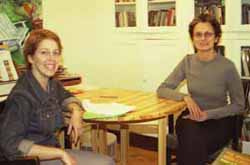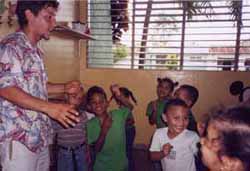Two New Diversity Fellows Study Activism and Music
Each year, the Committee for Community and Diversity (CCD) awards two students a $3000 grant for research that enhances and expands our understanding of diversity. This year's recipients are Leanne M. Stahnke, doctoral candidate in the Curriculum and Teaching Department with faculty sponsor Nancy Lesko, Associate Professor of Education, and Kenneth A. Kozol, Ed.M. candidate in the Arts and Humanities Department with faculty sponsor Bert Konowitz, Adjunct Professor of Music education and director of Spirit Improvision Group.
Stahnke's research is called "Becoming More Multiple: Phenomenological Interviews of Teenagers Engaged in Antiracism Work." The interview study is investigating how youth engaged in antiracism work convert their exposure to new ideas into fuel for social action.
Stahnke's project focuses on how teenagers become committed to anti-racist activism, a research area in which old theories of individual learning and background influences prevail. She brings contemporary, interdisciplinary theories (multicultural feminist and postcolonial feminist) to her interviews with young activists to explore ideas of multiple subject positions and non-static collaborative ideas of knowledge and identity, said Lesko, her sponsor. But Stahnke's research also interrogates theoretical perspectives that underlie studies of youth activism.
Twenty New York City youths, ages 19 and under, will be asked to explore in detail theTwo New Diversity Fellows Study Activism and Music experiences and influences that prompted them to get involved with antiracism work. In addition, they will be asked to think about various traditions of working with others to achieve social justice goals. Of particular concern in this research is the lack of emphasis in our culture today on collaborative work. Through long format interviews Stahnke wants to find out, "how do youth who are committed to the uplift of all navigate a culture that emphasizes autonomy and individual
achievement?"
From sweatshops to foreign policy to community organizations, Stahnke is looking at how activism plays a role for students in under-funded schools. She said that community centers are places where some kids are doing intrinsically motivated learning for the first time.
"Many of them dropped out of school because they were smart and had sharp social critiques," said Stahnke. "They critiqued the situation that they were embedded in and then it became unbearable. So they left to do sophisticated work in community centers."
One community activist group called "Youth Force" in the South Bronx, which is made up of 17-19 year olds, was started five years ago. One of their projects, "Teens and Tenants," documents housing violations, construction issues and unanswered complaints. Another project was to educate youths on their legal rights.
These kids are researching issues and really understanding how institutions operate, she said. It's more sophisticated learning than in the schools where they teach to the test. It's a chance for them to create projects that they actually care about and it helps get them back on track for college. At the end of her study, Stahnke will have made two presentations of her findings including a high quality audio montage of the voices of today's teen activists.
Kozol is also working with children's voices-singing voices. His research is called, "Musica de Nuestros Vecinitos: A Study of Mexican, Dominican and Puerto Rican Children's Music and Song Games from Country of Origin to New York City."
"Not only does Kenny have wonderful ideas," said Konowitz, "but he gets in the field and makes them work. He has overcome obstacles that would have deterred most people. I know this project would work because Kenny found a way to get into the little places-even with bus strikes and other problems-to gather children's music."
His project focuses on the folk music of children, ages 5 to 13, from Puerto Rico, Mexico and the Dominican Republic as it originates in those countries and as it continues in the lives of these children living in New York City. Kozol, who is a music teacher in Harlem and a musician, chose these countries because they are the three biggest Latino populations in the City.
This summer he traveled to the three countries to collect music in schools, camps, parks and in the streets. While he made friends with hundreds of children, he recorded, observed and documented the songs they sang and the musical games they played. He found many different songs, but there were a couple of songs that were the same in all three places.
"Songs get lost over time," he said. "As a music teacher, I want to try to preserve the culture of what's going on now and how it's evolved from the past."
Now he is gathering the songs from the children in New York City. Just as he shared American songs with the children in Mexico, the Dominican Republic and Puerto Rico, he will share the songs he gathered with the children in this City.
After he has gathered children's songs from all of these communities, he will determine the roles these songs serve in the lives of children, and then he will examine the transculturation process and its influence on this music. The research will conclude with a publication of the findings and a CD of the music collected. He also wants to do a concert with the children and with Spirit for the TC community.
Published Monday, Feb. 24, 2003

